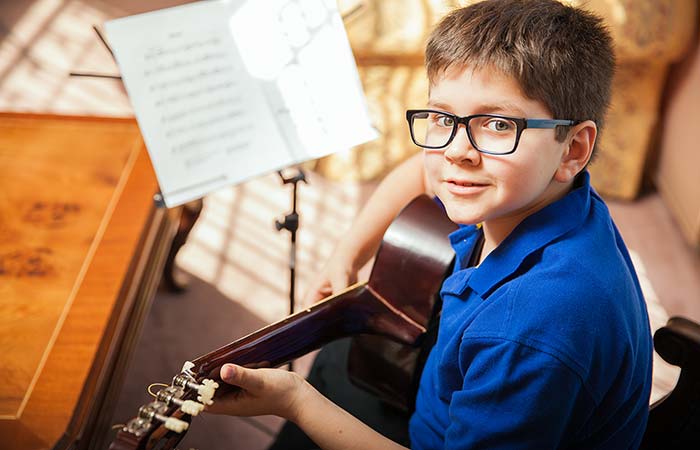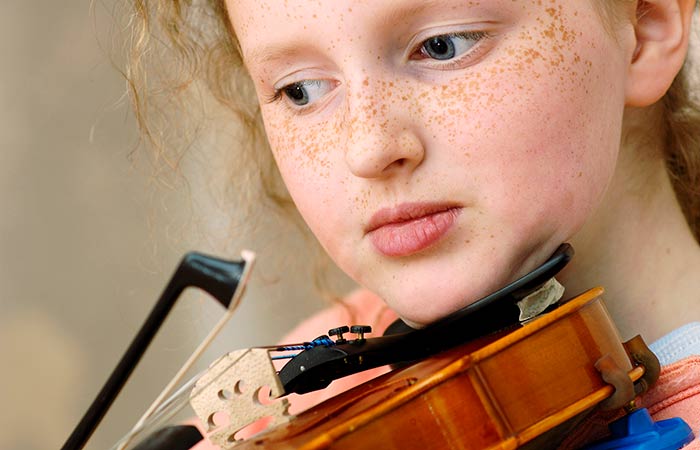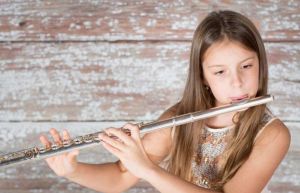Tot homines quot sententiae (“So many people, so many opinions”)
People hold so many different opinions on this subject, it is sometimes laughable.
Maybe the question is phrased wrongly – like asking when should a child start breathing.
The obvious answer is of course “as soon as he or she can.”
When one works through the literature in this subject, it becomes clear that the activities that should be envisaged at certain ages, and the child’s competence in regard thereto is really the rub of the matter.
For a child is involved in music even before birth, by hearing and reacting to sounds in the womb.
So I propose to deal with this question by discussing the child’s possible involvement with music at certain ages, and if you could have a child prodigy, you could just forward the time-table where applicable and advisable.
Before Birth
Vibrations and sounds are discerned by a baby in the womb.
So a pregnant mother playing piano or singing is in a sense already training her unborn child.
Many tests have been done in this regard and it is uncanny how much an unborn child discerns of the world outside the womb.
About 16-18 weeks in pregnancy the little one hears the very first sounds.
By week 24 the little one’s ears develop rapidly and he/she can recognise the mother’s voice, her/his native language, rhythms, word patterns and rhymes.
In the third trimester of pregnancy, the baby can definitely hear the music the mother is playing.
Birth to 4 years of age
This is the period that many child prodigies show their mettle.
Many of them started to play the piano at 3.
Usually, people are advised to let their children start piano playing between 3-5 years of age.
In general children at this age have not developed their strength, flexibility and coordination sufficiently to start playing most instruments. At The Children’s Academy in London we have specialist instructors who know how to work with toddlers of this very young age. It is imperative for your young one to learn with a teacher who knows how to teach successfully at such a young age.
They can be however introduced to certain percussion instruments, like the tambourine, triangle, xylophone, castanets and maracas.
It is also a good time to introduce children of this age group to appropriate group musical activities.
Vocal cords are the only innate instruments a human is born with, but they can be used (and will be used frequently) from birth. There are however usually tons of free stuff to use around the home, e.g the wooden spoon and tinpot.
5 Year-olds
3 Questions to ask:
- Does he/she exhibit finger and hand dexterity?
- Can they sit still for 30 minutes when engaged in an activity?
- Can they read?
Five is actually a fantastic age to get your child to start, but bear in mind your young one will need to study with the right teacher or school who knows how to work with him or her at such a young age.
Getting early music education can be a massive advantage for your child’s future cognitive development, so do not delay if possible!
6 Year-olds
Usually, they are learning an instrument because of school training.
Children in the 5-7 age group flourish with the piano, recorder and violin.
Violins are also available in small sizes.
Group music activities help a child to socialise and express him or herself.
They also share feelings by way of music.
At this age, they make up their own songs and especially learn new songs by repetition.
Dr Ibrahim Baltagi advises parents to start their children with music lessons as early as possible, because of the myriad of benefits flowing therefrom. (Dr Baltagi has written a series of books on children and music and is the Head of the Music Programme at the Lebanese International University. He is regarded as one of the leading authorities on children and music.)
7 to 9 Year-olds
There is a growing consensus that a window exists between birth and 9 years to develop music sensibility.
It is similar to the window existing for children to learn languages.
It is of the utmost importance to expose children in this period to the processing and understanding of music.
The important question is not when to start music lessons, but what the purpose of those lessons should be at their age and competence level.
Very young children should not try to master an instrument but to gain experience and develop a relationship with a musical instrument at a young age.
The lessons should not be formal or fast.
By this age (7-9) they have developed the finger strength, flexibility and hand size required to ensure they can press down on the strings along a fretboard. Instruments such as the ukulele, guitar, bass guitar, violin, and bass violin, can be successfully introduced to the child at this age.
In summary, one can say that informal activities with music should start soon after birth, followed by more structured classes by the age of three, and lessons to really learn an instrument between six and nine.
Remember to move the calendar if you have a genuine child prodigy on your hands.
What happens if a child misses the 0-9 window?
Fortunately, the brain is like a sponge and retains even the most fleeting of exposures, which enables a late learner to catch up and even excel, once his or her interest is aroused.
Many artists only appeared late in life to enjoy uninterrupted years of productivity in their art. Here are a few musicians: Leonard Cohen (50), Thelonius Monk (46), Andrea Bocelli (41), and Susan Boyle (46).
Is there a lower or an upper age limit for learning a musical instrument?
The answer on both counts is a clear “no!”.
You must realise however that the older you are, the more patience you may need, and the younger you are the more you might have to wait for your hand and/or body to become stronger or bigger to be able to master the instrument more effectively.
In both instances, the sound advice is, start learning that instrument as soon as possible!
Do not waste any time.
Schedule those lessons immediately for you and your child.
And if your child has not been born yet, ensure that you and your child enjoy ample soothing music whilst pregnant and that you sing to your child regularly.
If your child appears to be of above intelligence, do yourself a favour and treat your child on the level that he or she appears to operate easily on.
Do not treat the child like the commensurate age group should be treated, but also make no inappropriate fuss about the child.
Even if you have a child prodigy on your hands, treat it like a normal thing.
The child will know when he or she is a cut above the rest and will act normally to it unless you throw a spanner into the works.










